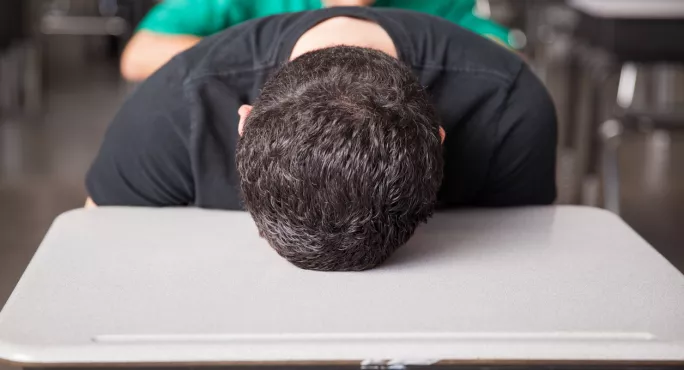The secret to engaging the most reluctant learners?
Share
The secret to engaging the most reluctant learners?
“Hi, how are you this morning,” I ask with a cheery enthusiasm I’m not really feeling; it’s the last lesson of the day in what has turned out to be quite a “challenging” (read “out of control batshit crazy”) school. The girl - slumped face down on the desk, her arms forming a protective wall around her head - doesn’t reply.
“Do you need me to go over the work for the lesson with you again?” I try.
Nothing.
“I can get you some lined paper if you don’t have your exercise book with you today.”
Still nothing. I think she may actually be asleep.
I try switching from academic to pastoral mode. “Are you feeling okay? Would you like me to get you some water?”
Thinking about it, falling asleep less than five minutes into the lesson would be pretty impressive. I look a little closer. I’m not sure she’s even breathing. I figure a different approach is called for.
I raise my voice slightly and adopt the tone of a paramedic trying to get a response from someone collapsed in the street. “If you continue to be unresponsive I’m going to have to send for the school nurse. I’m worried you might be dead.”
The girl’s eyes open very, very slowly. With no other perceptible expression or movement, not a twitch of the nose, not a hint of a sneer, not a grunt or a sucking of teeth, she manages to convey a remarkably forceful impression that she is both entirely indifferent to my presence and yet also extremely pissed off. The girl is clearly in the gifted and talented bracket with regard to her non-verbal communication skills.
“That’s better,” I say breezily. “What’s your name?”
This elicits only a dismissive narrowing of the eyes. Perhaps that was a little ambitious. I try something easier.
“So don’t you like maths then?”
“Obviously not.”
A response. Definite progress.
“Okay, what’s your favourite subject?”
“Going home.”
“Yeah, I guess that’s not technically a subject…” I check myself; keep it light. ”So what do you like doing?”
“Sleeping. Which I was getting on with just fine.”
“And what time did you go to sleep last night?”
The girl lifts her head; I notice that there’s a paperclip stuck to her left cheek where it’s been pressing down on the desk. I’m about to point this out to her but think better of it. Maybe it was already there when she arrived in the class. She hauls herself into a semi-upright position, leaning back in her chair and sizing me up.
“I don’t know. Late. What’s it got to do with you? You’re not even a proper teacher.”
Ouch. I’m going to let it slide, though.
“Do you often fall asleep in class?” I say.
“Only when the teacher’s really boring,” she deadpans.
I’m starting to like this kid.
“I’m going to tell you a secret,” I say, lowering my voice to a whisper. For a split second I see the tiniest glimmer of interest behind her eyes. “I’m not really a maths teacher.”
She considers this for a moment. “But this is a maths lesson. I should have a maths teacher teaching my maths lesson.”
It’s a pretty solid bit of logic on her part, and although she didn’t seem too concerned about this a few minutes ago, I decide once again not to mention this and instead I plough on with my point. “I actually teach psychology. And what psychology tells us, is that sleep is really, really important.”
“Why?”
And my job here is done. Okay so we don’t end up doing much maths, but I do get to tell her how sleep affects cognitive function and memory and the immune system and emotional stability, and she listens and even asks a few more questions. In this job, it’s important to remind yourself from time to time that although not everyone likes school (and God knows there are some schools I’ve been in where that is totally understandable), pretty much everyone likes learning. For some people, it just needs to be on their own terms.
The writer has recently taken up supply teaching after 20 years in a full-time teaching job




